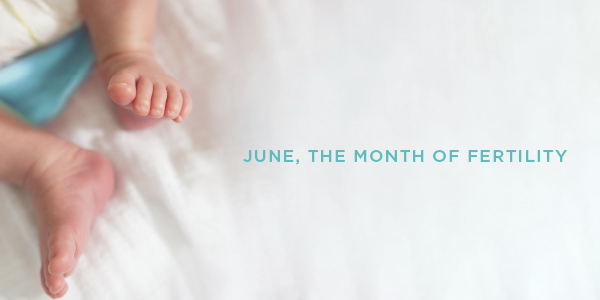

National Infertility Awareness Week was started in the US in 1989 by a non-profit organisation, RESOLVE: the National Infertility Association. It now works in partnership with Fertility Europe, the Belgium-based pan-European patient partner organisation of ESHRE, the European Society of Human Reproduction and Embryology. This year, in 2021, the whole month of June is dedicated to Infertility Awareness. The goals are:
- To raise infertility awareness and encourage communication to break down the silence and stigma that can surround infertility issues.
- To help couples and individuals experiencing infertility to cope with their condition through:
- Access to information in order to understand their problems.
- Understanding how their problems might be resolved.
- Knowing where to go to seek help.
That’s where we come in. At IVI, we acknowledge and fully support the need for education and awareness-raising, and better communication at local and national levels to remove taboos and promote understanding.
Raising infertility awareness
Considering that an estimated 1 in 6 couples experience difficulty conceiving, it seems strange that awareness is not more widespread. Perhaps popular press coverage, which tends to focus on infertility as a ‘female problem’ undermines a real understanding of the situation. That is that, where a cause of infertility for a couple can be identified, in half of cases it is associated with a male factor. The full picture is that 30% of infertility is caused by female factors, 30% male, and in the remaining 40% either both partners could contribute or a cause cannot be identified.
The popular press also tends to seize upon the idea that age-related infertility in women is overwhelmingly the main cause of declining fertility. While it’s true that a woman’s fertility declines after the age of 35, infertility also affects 7% of women aged 20 to 24, 9% between the ages of 25 and 29, and 15% between 30 and 34. Since we know that the male/female ratio is roughly equal, we can assume the statistics for young men are about the same.
Encouraging communication to break down barriers
Raising awareness is all about encouraging communication. In our era of open discussion about previously ‘taboo’ topics like sexuality, financial status and mental health issues, infertility seems to remain a difficult topic. The saying goes that the facts speak for themselves, but perhaps these facts need to find a voice through discussion more widely among real people, in the workplace, in social settings and at home:
Male factor infertility has skyrocketed
A 2017 study published in Human Reproduction Update found that male fertility in the developed world has declined overall by 52.4% over the past few decades. The impact of these bald figures on the lives of individual men throughout Europe and the rest of the world can be devastating and the lack of wider awareness can lead individuals to feel bewildered, lonely and unsupported.
The age of first-time mothers has increased
We are more familiar with the economic and social factors that have led to women delaying their first child, but not all infertility in women is age-related. Ovulation disorders, fallopian tube injuries or blockages and endometriosis are all factors which, if they were discussed more easily, could help a lot of women to feel less isolated.
Secondary infertility: the unacknowledged fertility problem
The inability to have a second child is more common than many people realise, accounting for around 50% of all infertility cases. It can be difficult for sufferers to open up about this problem when they already have one child, for fear of an insensitive response, or an attitude that they should be grateful for what they have.
A lot of incomprehension could be avoided if these issues, and others like them, were more openly discussed and acknowledged. This is one of the aims of National Infertility Awareness Week.
Access to information
Access to information about infertility and fertility support services continues to improve, with local support groups too numerous to mention throughout Europe. At national and supra-national level, primary sources of information include:
- ESHRE, the European Society of Human Reproduction and Embryology
- Fertility Europe, a European umbrella organisation representing patient associations in more than 20 European countries
- HFEA, the UK’s Human Fertilisation & Embryology Authority
These bodies are rich sources of information for users but as always, when you are looking for advice on local services, your primary care provider is often a good first step.
Understanding how fertility problems are treated
Raising awareness about infertility is not only about understanding what infertility is, how widespread it is and what causes it, awareness includes knowledge of the various treatments and techniques that are available. We at IVI aim to contribute by publishing an informative description of some of these on our website, including:
- Artificial insemination, the simplest form of assisted fertility treatment;
- In vitro fertilisation or IVF, the most widespread and best-known infertility treatment;
- Egg donation, a highly successful IVF treatment using donor eggs;
- Genetic IVF, which combines IVF with genetic screening.
- Many other tests and techniques are fully described on our website. We encourage you to browse, learn, and ask questions.
Knowing how to get help with fertility problems
When you’ve done your research and found out as much as you need to know about your own fertility issue, the next step is knowing where to go for advice, help and treatment. In many cases your primary care provider is the obvious first step, or if you prefer to go straight to a fertility specialist, we’re always here. IVI has 65 clinics in 9 countries around the world and in Europe you can find clinics in Spain, Italy, Portugal and the UK. You can easily get in touch, and we’re here to help.




Comments are closed here.